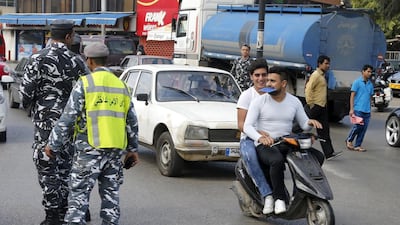BEIRUT // With fines as high as Dh7,000, Lebanon’s latest attempt to crack down on the general lawlessness on its potholed, traffic-choked roads has shown some initial results, but activists say more steps are needed to make lasting change.
Authorities have warned that common offences such as speeding, driving under the influence and ignoring traffic signals will no longer go unpunished under a new law that took effect on April 22.
Lebanon’s police, the Internal Security Forces, have been enforcing the law in phases. In the first week, they targeted drink driving, speeding and reckless endangerment. From May 1, police cracked down on offences such as riding motorcycles without helmets, using phones while driving, not wearing a seat belt, driving the wrong way and running red lights.
“Everything related to the chaotic situation on the road and changing it cannot be done in a few months,” said Ziad Akl, president of the Youth Association for Social Awareness (Yasa), a Lebanese non-governmental organisation that has pushed for road safety. “Definitely it’s a good step, but we need other steps to be done.”
In Beirut, checkpoints have been set up across the city, slowing traffic to check for violations and to remind motorists of the new law. Fines start at 50,000 Lebanese pounds (Dh121) for minor infractions, such as not wearing a helmet on a motorcycle, and go as high as 3 million pounds for serious infractions, such as driving under the influence of alcohol.
The police hope the new law will halve the number of road deaths by 2020. According to Lebanon’s traffic management centre, 560 people were killed in road accidents in 2013, the last year for which figures are available.
The new traffic law was approved by the government in 2012 and replaced antiquated legislation dating back to 1967. The new law updated and added infractions, while also increasing penalties. It also introduced a points system for driving licences whereby licenses could be revoked if a driver received too many violations.
But not everyone has welcomed the new rules. In the cities of Tripoli and Sidon, attempts last month to enforce the law were met with burning tyres and scuffles with police.
Despite this opposition, however, there are already signs of progress. Taxi drivers now insist that passengers wear seat belts, though in some battered old sedans where seat belts have long been broken, this means holding the belt in place for the entirety of the journey to fool the police.
It is perhaps for reasons like this that there is both optimism and scepticism over whether the new law will work.
“If you look at the previous attempts, they all failed and they all started the same way,” said Najib Mitri, a blogger who has advocated for road rules and safety. But for now “people are driving more slowly and carefully at night and wearing their seat belts because the fines are huge”.
Mr Akl said “the Lebanese government failed and the whole Lebanese society failed” in earlier attempts to enforce traffic rules.
Enforcing laws is difficult in Lebanon. A ban on smoking in cafes, bars and restaurants instituted three years ago is seemingly no longer enforced. Lebanon has seen crackdowns on traffic violations before, but they only lasted a short time before things returned to business as usual. However, there is optimism about the current law due to how aggressively the authorities have been enforcing it and the hardened political consensus backing it.
One important step in ensuring that this law works, Mr Mitri said, is to force the police to follow the rules themselves.
There are social media pages dedicated to documenting police indifference to road rules: officer riding mopeds without helmets or using phones while driving or monitoring traffic, and standing idly by while motorcyclists pop wheelies in front of them.
Mr Mitri said that every day he sees policemen riding without helmets, driving the wrong way and not wearing seat belts.
“I don’t think we should be seeing the Internal Security Forces officers doing that,” he said. “I think they should be punished even more severely than [civilian] drivers. They should be the role models for others to follow, not the other way around.”
To be successful, the law will also have to be applied impartially and not bent as a result of wasta – influence due to connections – or intimidation. But this is a tall order in a country where convoys of politicians’ SUVs roar down boulevards with little regard for other road users, and where people connected to militant groups and illegal activities ditch their licence plates – a warning that you would rather not know who is inside the vehicle.
“We cannot ask road users to see the law applied on some people in some regions on some roads and not enforced on other people on other roads in other regions,” said Mr Akl. “We need it imposed on all.”
With corruption rife in Lebanon, it will also be important to ensure that officers do not use the new system to elicit bribes. Mr Mitri suggested creating a smartphone app that, among other things, would allow drivers to report corrupt officers.
He said it was also important that the government showed where the money from fines went and that it was used to repair the country’s neglected roadways, where deep, dangerous potholes can appear unexpectedly on otherwise smooth motorways, and where debris is rarely cleared away.
“The idea is to help people become aware of the traffic law and care about their own safety, not just fine them and send the money elsewhere,” Mr Mitri said. “We should know that these fines they are paying are going somewhere to improve the infrastructure, so the government does its job at the same time.”
foreign.desk@thenational.ae

